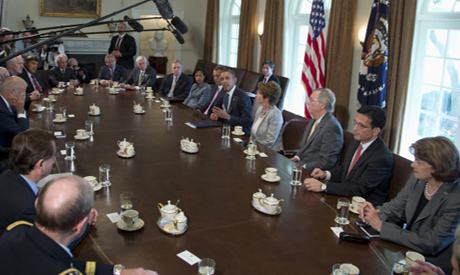
President Barack Obama speaks to media in the Cabinet Room of the White House in Washington, before a meeting with Congressional leaders to discuss the situation in Syria, Tuesday, Sept. 3, 2013 (Photo: AP)
President Barack Obama's call for a military strike in Syria won significant momentum Tuesday, with leaders of both parties in Congress saying they are convinced that Syrian President Bashar Assad used chemical weapons against his own people and that the United States should respond.
The top Republican in Congress, House of Representatives Speaker John Boehner, said taking action is something "the United States as a country needs to do."
Boehner emerged from a White House meeting with Obama and other top lawmakers and said only the US has the capability to stop Assad and warn others around the world that such actions will not be tolerated.
Obama urged Congress to hold a prompt vote once it returns from holiday next week.
The president also tried to assure the public that involvement in Syria will be a "limited, proportional step."
"This is not Iraq, and this is not Afghanistan," Obama said.
He met with top lawmakers hours before he leaves on a three-day trip to Europe, with a visit to Sweden and a G-20 summit in Russia
The US says it has proof that the Assad regime is behind sarin gas attacks that Washington claims killed at least 1,429 people, including more than 400 children.
The Britain-based Syrian Observatory for Human Rights, which collects information from a network of anti-regime activists, says it has so far only been able to confirm 502 dead.
The Obama administration argues that the United States must exert global leadership in retaliating for what apparently was the deadliest use of chemical weapons anywhere over the past 25 years.
Boehner's support is key, but opposition Republicans in Congress do not speak with one voice.
And after a decade of war in Iraq and Afghanistan, polls show most Americans opposed to any new military action overseas.
Some lawmakers say Obama still hasn't presented good evidence that Assad's forces were responsible for the Aug. 21 attack. Others say he hasn't explained why intervening is in America's interest.
Those questions come a decade after the Bush administration badly misrepresented the case that Iraqi President Saddam Hussein possessed weapons of mass destruction.
"There's no problem in our having the language that has zero capacity for American troops on the ground," said Secretary of State John Kerry, one of three senior officials to make the case for military intervention at a Senate Foreign Relations Committee hearing.
"President Obama is not asking America to go to war," Kerry said in a strongly worded opening statement. He added, "This is not the time for armchair isolationism. This is not the time to be spectators to slaughter."
Kerry sat shoulder-to- shoulder with Defense Secretary Chuck Hagel and Joint Chiefs Chairman Gen. Martin Dempsey at the hearing, while a few hundred miles awayt UN. Secretary-General Ban Ki-moon urged caution.
He said any punitive action against Syria could unleash more turmoil and bloodshed, and he advised that such strikes would be legal only in self-defense under the UN charter or if approved by the organization's Security Council.
Russia and China have repeatedly used their veto power in the council to block action against Assad.
In the Middle East, Israel and the US conduct4ed a joint missile test over the Mediterranean in a display of military might in the region. A classified briefing open to all members of Congress was planned as well.
House Republican Majority Leader Eric Cantor also said he would support Obama's call for military action against Syria.
Obama also won conditional support Monday from two of his fiercest foreign policy critics, Republican Sens. John McCain and Lindsey Graham.
McCain said Tuesday he is prepared to vote for the authorization that Obama seeks, but he told NBC he wouldn't back a resolution that fails to change the battlefield equation, where Assad still has the upper hand.
Sen. Robert Menendez, chairman of the Senate Foreign Relations Committee, told CBS he believes the panel will back Obama if the administration explains "the full case" for the use of force as well as what it sees as the end result.
"It sends a message" not just to Syria but to Iran, North Korea and terrorist groups, Menendez said.
The administration argues that the alleged sarin gas attack last month violated not only the international standard against using such weapons but also Obama's "red line," set more than a year ago, that such WMD use wouldn't be tolerated.
Syria's conflict has claimed more than 100,000 lives in the past 2½ years. The fight has evolved from a government crackdown on a largely peaceful protest movement into a full-scale civil war scarily reminiscent of the one that ravaged Iraq over the last decade.
Ethnic massacres have been committed by both sides, which each employ terrorist organizations as allies.
Short link: